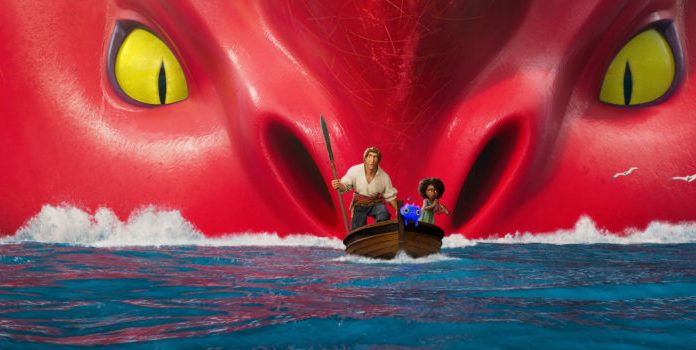(Ben Sellers, Headline USA) It is not unusual at the end of movies (some based on true stories, some fictional ones) to see the a final scene that explains what happened to the characters afterward—the implication being that the action was just a small part in their ongoing narrative.
With that in mind, I am undertaking to write my own epilogues at the end of this column, revealing the inevitable outcomes that might befall the various characters in Netflix’s The Sea Beast if the make-believe world of the streaming service’s top-trending children’s film were subject to the same set of truths as the world of its viewers.
First, I must do some unpacking:
AHAB THE ACTIVIST
For non-Netflix subscribers or those without children in their orbit of a certain viewing age, Disney alumnus Chris Williams’s computer-animated tale may not have registered highly on the must-watch list. But ultimately, it has the potential to wrap its toxic tentacles around all that Americans hold dear, threatening liberals and conservatives alike.
Undoubtedly, Netflix did what it often has: transposed a layer of woke didacticism onto a genre that its algorithms detected was a top mover (perhaps due to the recent popularity of sea shanties) in order to achieve peak indoctrinatory effect.
On its surface, The Sea Beast is an otherworldly period piece in the tradition of Disney’s Pirates of the Caribbean and Netflix’s own Shadow and Bone, borrowing from familiar pirate folklore, along with elements of magical fantasy.
Of course, most—if not all—such stories owe a debt of influence to Moby Dick, which essentially pioneered the genre, and this is no exception. Yet, The Sea Beast is not a simple retelling of Herman Melville’s classic story about the white-whale-obsessed Capt. Ahab. Rather than creating a Disneyfied dilution of the original to make it accessible to young audiences, the movie offers a drastic and deliberate subversion of it to warp the meaning entirely while attacking the context in which it was written.
Specifically, the movie—a theme of which is the need to rewrite the erroneous histories of our past culture (sound familiar?)—converts the tale’s central nemesis from a symbol of man’s hubric attempts to conquer the sublime and overpowering elements of the natural world into a friendly, misunderstood maritime version of Clifford the Big Red Dog.
Well, sort of.
Upon further inspection, it appears its titular sea beast, the Red Bluster (or “Red” for short), is a stand-in for a different type of conflict. What it represents is the antithesis of all Western and American values, including our systems of capitalism, democracy and, of course, “whiteness.”
Look closely and you might notice its red-and-yellow color scheme looks a lot like those of communist China and the Soviet Union.
AN ALLEGORICAL DEEP-DIVE
The concept of allegory—in which a simple but symbol-rich story conceals a parallel, ulterior meaning—was one of my favorite units to cover as a high-school teacher because it required, much like a riddle, the creative application of deductive reasoning—and it allowed me to incorporate episodes of Lost into my lesson plans.
From Robinson Crusoe to Gilligan’s Island to Lord of the Flies and Life of Pi, seaborne stories offer a ready-made platform for allegorical interpretations that invite a deeper analysis. After all, the ocean is one of the great immutable and indominable constants of nature, making it a convenient foil to the world of man and the corruptive influence of society, and rife with Jungian archetypal symbolism.
But while it may use the ocean allegory to mask the thin veneer of its radical Marxist messaging, there is very little about The Sea Beast‘s repurposing of the literary device that one would consider to be creative. It’s like Animal Farm for the Antifa set, but without the intellectual heft of George Orwell.
At its surface level, there are cues obvious to most everyone that The Sea Beast is taking liberties with its genre to inject a hearty dose of leftist propaganda. Immediately, viewers must suspend disbelief to reimagine racial and gender boundaries that, while more plausible for a pirate’s ship than in other facets of its contemporaneous society, were not likely to have been as openly flouted as they are in the dramatized version.
The action begins as Maisie Brumble, a cockneyed orphan girl with black complexion, confidently swaggers up to Jacob Holland, a famed hunter of sea monsters. Maisie declares her intention to join the Inevitable, the ship helmed by Jacob’s adoptive father, the legendary Capt. James Crow.
She pulls out a book documenting the exploits of the ship’s crew and recites their heroics. Spoiler alert: If it feels uplifting to see such ambition and passion for a noble cause kindled in a disadvantaged, young, minority female, that’s because you’re racist. Her desire for conquest is woefully misguided, through no fault of her own.
Another black female, first mate Sarah Sharpe, is clearly the ship’s voice of competence, bridging the logistical needs of managing the large crew of the Inevitable with the loftier monster-hunting objectives of Capt. Crow.
Sharpe and many other crew members all seem to be on the LGBT spectrum or else affiliated with the motley array of identity-politics constituencies often courted by Democrats. The only thing missing is a pirate in a wheelchair (although Sharpe does have a peg-leg).
And, indeed, the crew of the Inevitable appears to be a direct allegorical representation of the Democratic Party, with Crow a substitute not only for Moby Dick‘s Capt. Ahab but also for Joe Biden and other archaic, out-of-touch party leaders.
O CAPTAIN! MY CAPTAIN!
As Biden’s poll numbers plummet faster than a dinghy in a whirlpool, leftists have begun to revolt against their dim and decrepit president. However, his past episodes of racism, misogyny, etc., are always mitigated by the fact that he was doing what was acceptable at the time—just as Crow and Holland manage to avoid any meaningful reckoning for their slaughter of innocent sea monsters.
“You can be a hero and still be wrong,” the movie declares on at least two occasions, challenging traditional Democrats to rethink their faith in classical liberalism, which has only served to preserve destructive and antiquated modes of thinking.
Meanwhile, Sarah Sharpe, the trusty first mate, is reduced to representing Democrats’ traditional black voting bloc, unwavering and unquestioning in its loyalty to the party until the foolhardy white man in charge finally finds himself at odds with the interests of the crew.
Republicans are largely sidelined in the story, relegated to an auxilliary role as a rival monster-hunting ship, the Imperator. Well armed but ill-equipped for the job at hand, it is ambushed and quickly dispatched by “Red.”
Yet both ships’ crews serve the same master—the king and queen of the subtly named White Rock—representing imperialism, privilege and all the ills of left-wing fever dreams. For centuries, their greatest goal has been suppressing the sea creatures before they swim ashore to threaten The Crown’s systems of white supremacy.
In the end, it takes the wisdom of a child to bring about a broad-based recognition that the evils they have been fighting for centuries were not so bad after all. And for that same child then to lecture a crowd of citizens reeling from the near destruction of their homes that their entire history has been thorougly embellished through the ages.
The astonishing lack of self-awareness—that leftists would use an overtly propagandist work of animated fiction to moralize about the perceived historical inaccuracies feeding into its concepts of systemic injustice—seems to be a hallmark of critical race theory and related leftist movements. “Tear up those history books and believe this cartoon instead.”
Yet, just as sure as I incorporated episodes of Lost in my classroom, The Sea Beast is destined to become a staple of woke English teachers everywhere, replacing their study of boring canonical literature with a more suitable modern message.
Thus, it is of the utmost importance that students learn the true story of The Sea Beast and what happened to its characters after the credits rolled.
WHERE ARE THEY NOW?
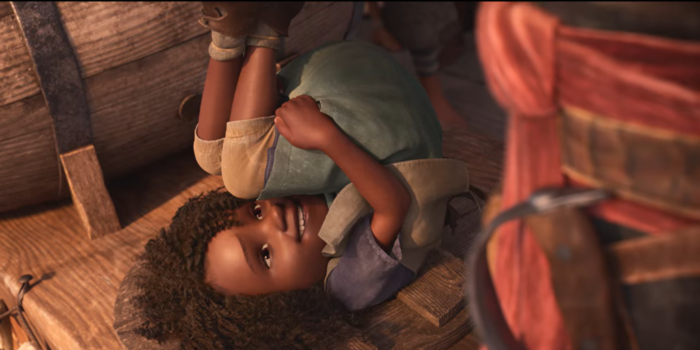
Maisie Brumble, the spirited street-urchin “full of vinegar,” was revealed to be an activist plant funded by The Crown to disrupt the status quo so that White Rock’s elites could force the transition to a New World Order and reinforce their hold on wealth and power—much as leaders of the Black Lives Matters movement and others funded by powerful billionaire oligarchs have exploited black outrage over perceived injustices to enrich themselves.

Jacob Holland, the paternalist white savior representing current progressives in power, began vocally denouncing the killing of sea beasts after discovering the error of his ways, but he continued to reap massive profits from his stock investments in Red Bluster ambergris as the commodity became more and more scarce.

His life’s ambition destroyed, Capt. Crow plunged into a state of sheer insanity, continuing to imperil those under his charge. But whenever his crew came to the brink of mutiny, the ship’s media would gaslight them and insist everything was fine to avoid having Crow replaced by an even worse alternative until such time as it became politically expedient.
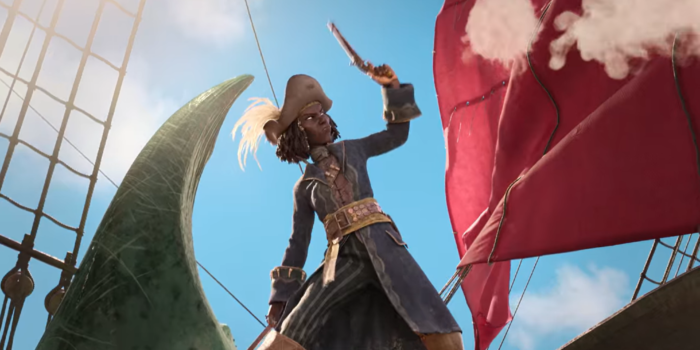
After becoming woke to the systems of oppression that had kept her down, Sarah Sharpe quickly realized she had no desire to shoulder the responsibility of captain and was bribed into complacency by Crow with promises that he would appoint a black woman to the ship’s high judicial council.
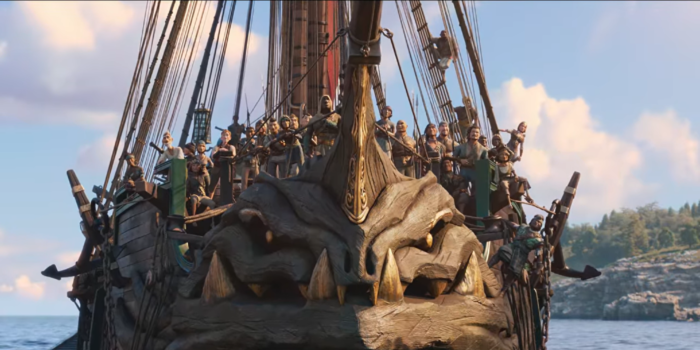
Despite having stared death in the eyes many times while hunting sea beasts, the crew of The Inevitable became traumatized after some of the surviving members of rival ship The Imperator boarded their vessel and engaged in a four-hour-long insurrection. The crew spent the next two years declaring it the greatest threat they had ever faced and devoted all their resources henceforth to hunting down the rival ship’s castaways so that they could throw them in the brig.

Although contented at first to carry its new human friends on its back, the Red Bluster saw the opening for a new cultural revolution with all the hunting ships neutralized and soon began building its own empire. It leveraged corrupt business deals with Jacob and obtained compromising photographs of him with Maisie to compel Capt. Crow to cooperate by keeping the other hunters at bay as it laid claim to vast swaths of disputed territory.

After rebuilding, the capital city of White Rock began a cultural exchange program with the Blusters, but the beasts quickly began laying their eggs in its boundaries, overtaking the human population and demanding citizenship rights. They formed a powerful lobbying organization, allowing the king and queen to retain their titles, provided they abdicated all real authority to the beasts.
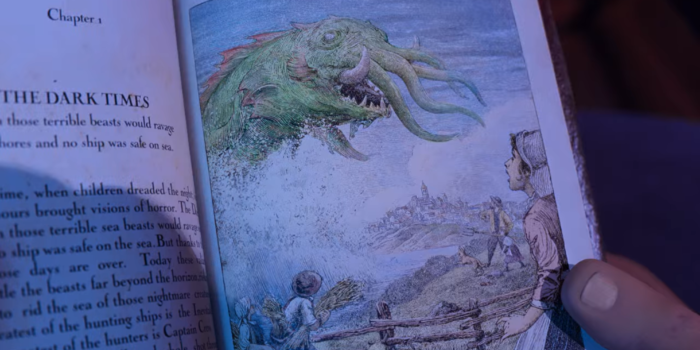
Maisie rewrote the history book, not only re-examining the conflict between man and beast but reframing the sea beasts as victims of oppression—even though all but the Red Bluster still intended to harm and prey on mankind. While evidence later showed that the myths about beasts attacking coastal cities during the “Dark Times” had some historical basis, the alternative narrative insisted that it was stolen land and the beasts were owed reparations.

